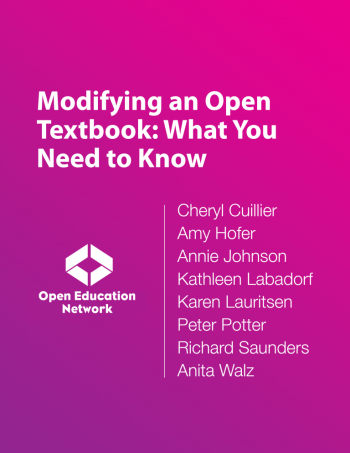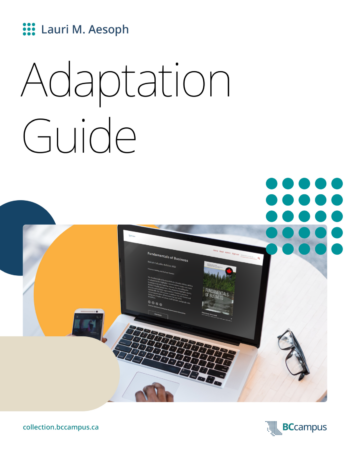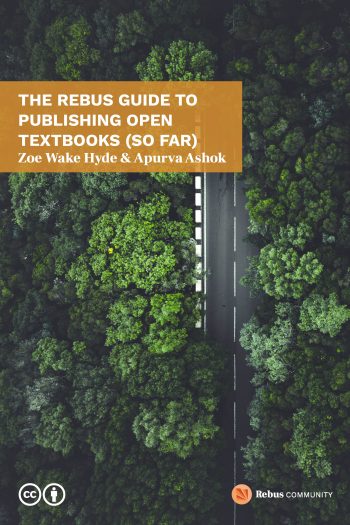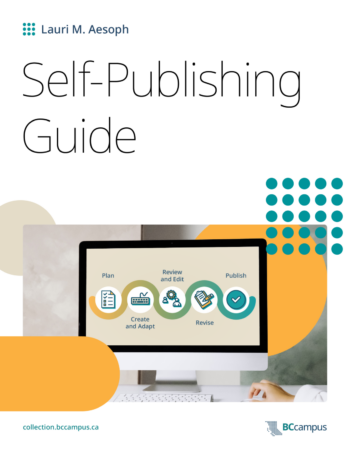Creating OER
Creating an OER is similar to authoring any other document, except that you are assigning that content an open license which usually allows for its free use and re-purposing by others.
Things to consider:
- What license will you assign to your OER? Using a Creative Commons License will provide you with the legal framework to share your OER.
- How will you make your OER accessible to all students? We recommend using the OpenBC's Accessibility Toolkit to address accessibility issues.
- Where will you create and host your OER? There are sites available from which you can directly upload and share your materials, and there are educational repositories designed specifically to assist with the creation and hosting of OER.
- How will you share your OER? Once you've created your OER, you may want to share it across many directories and repositories for maximum visibility. Consider sharing your OER via MERLOT, OER Commons, or Open Textbooks.
Visit the "Resources for Building, Hosting, and Sharing OER" section below for even more recommendations.
-
Adopt, Adapt & Author - UC DavisUC Davis has a stellar guide to help you determine if you should adopt an existing OER resource, adapt it to your needs, or author an entirely new one.
-
OERu - OER Development ProjectThis free, self-paced microcourse provided by OERu will help you get started creating and sharing OER materials via WikiEducator.
-
OER Tools: Documentation for InstructorsThis guide, adapted by the Iowa Open Education Action Team, contains a comprehensive overview of tools for instructors to use when creating and adapting OER.
-
OER Workflow DiagramThis workflow produced by the University of Hawaii can help you understand the major steps in the production of OER and manage your own progress towards creating OER. Key questions are asked at various points and direction to support from library and OER specialists are included.
-
Open Textbook Toolkit - University of TorontoThis toolkit is a living document designed to support university and college faculty who would like to create their first open textbook. Key sections in this toolkit are organized in an FAQ format and include information related to stakeholders, technology, copyright, accessibility, and more general production and classroom use workflows of an open textbook.
-
Open Pedagogy Project RoadmapThe Open Pedagogy Project Roadmap is a modular resource to guide faculty through the conception, creation, and sharing of an Open Pedagogy project.
Modifying OER
Modifying an existing OER is a a simpler way of adopting content to suit your needs than creating a new OER. Before modifying an OER, check that the Creative Commons license does not contain a "no derivatives" clause. If it does, you do not have permission to modify the work. Search for formats that are conducive to modification, such as .docx and .rtf. Once you've downloaded and modified the OER, you can upload it to many of the sites listed in the "Sites for Creating and Hosting OER" section.
-
 Modifying an Open Textbook: What You Need to Know
by
Publication Date: 2016This is a five-step guide for faculty, and those who support faculty, who want to modify an open textbook. Step-by-step instructions for importing and editing common open textbook file and platform types are included.
Modifying an Open Textbook: What You Need to Know
by
Publication Date: 2016This is a five-step guide for faculty, and those who support faculty, who want to modify an open textbook. Step-by-step instructions for importing and editing common open textbook file and platform types are included. -
 Adaptation Guide
by
Publication Date: 2016The Adaptation Guide is a practical reference about how to customize — or adapt — an open textbook so that it better fits your needs in the classroom and elsewhere. This guide defines the term adaptation and discusses reasons for revising a book, why this is possible with an open textbook, and the challenges involved.
Adaptation Guide
by
Publication Date: 2016The Adaptation Guide is a practical reference about how to customize — or adapt — an open textbook so that it better fits your needs in the classroom and elsewhere. This guide defines the term adaptation and discusses reasons for revising a book, why this is possible with an open textbook, and the challenges involved.
AI in OER Creation/Adaptation
As generative large-language models (LLMs) like ChatGPT, Claude.ai, Google Gemini, and Microsoft Copilot have come into wider use, there are opportunities to use this emerging tool as part of the OER creation/adaptation process. The following materials can be used as you consider using an AI tool to assist in OER work.
-
Guidelines for Using Generative AI Tools in Open Educational ResourcesThis set of guidelines from Affordable Learning Georgia is intended for faculty and staff to use when creating new open educational resources (OER) or revising existing OER using generative artificial intelligence (GenAI) tools. These guidelines assume that USG faculty and staff do not have access to the training datasets or validation datasets a generative AI tool uses in order to train its neural networks, and these guidelines are therefore focused on the use of the output of many generative AI tools.
-
Framework for Accessible and Equitable Artificial Intelligence (AI) in EducationThis is a practical guide to the dizzying domain of artificial intelligence within the education ecosystem, with a particular focus on the impact on equity and accessibility. AI and accessibility are beginning to have an interesting conversation. Not unlike the conversation about AI in general, the conversation about AI and accessibility in education can be found taking a techno-solutionist or techno-tragedist perspective. As we grow wary of this false dichotomy, we move toward what is much more likely to be the case: that it will be “both/and” and “neither/nor.” AI can make things better. It can benefit us all, it can address inequities, and it can lower barriers for people with disabilities in education. It can equally be used to amplify inequities (intentional and unintended), including discrimination against people who do not fit a “norm.”
Resources for Building, Hosting, and Sharing OER
Building OER
-
MERLOT Content BuilderMERLOT offers an easy-to-use website builder for OER projects.
-
Open AuthorOER Commons offers a new drag-and-drop editing tool, Open Author, to easily create or adapt works for publication directly into OER Commons.
-
Screencast-O-MaticA free and easy-to-use tool to record screencast videos.
-
Tools and Techniques for Creating OERThis chapter from The OER Creation Toolkit details commonly-used software at various levels of sophistication.
-
WikiEducatorWikiEducation allows educators to author and organize their open courseware materials.
-
Middlesex Community College AI OER BuilderThis tool, developed by Middlesex Community College, allows educators to quickly develop OER materials using existing open materials. Please note that it will take a bit to generate the response!
Hosting & Sharing OER
-
Google DriveFor sharing documents (lesson plans, activities, instructional materials, etc.) Once you have uploaded your materials, get a public URL for a document or collection by changing the sharing settings to "Public on the Web."
-
Knowledge CommonsKnowledge Commons is an open access repository of cross-disciplinary materials hosted by Michigan State University. The platform also allows users to create and share their own OER via hosted WordPress sites.
-
MERLOTMERLOT is a large repository of open textbook and course materials.
-
OER CommonsDiscover, create, and host your own OER textbooks.
-
SlideshareSlideshare is a great place to store slidedecks.
-
WordPressWordPress is a free and easy-to-use publishing platform.
-
YouTubeThe YouTube license terms allow all users the ability to watch, adapt, and share content hosted on the platform when published publicly. You are able to apply a Creative Commons 3.0 license when uploading your work, though you may want to consider adding an additional note in the video description clarifying the rights you reserve.
In-Depth Guides
-
 A Guide to Making Open Textbooks with Students
by
ISBN: 9781989014035Publication Date: August 29, 2017A handbook for faculty interested in practicing open pedagogy by involving students in the making of open textbooks, ancillary materials, or other Open Educational Resources. This is a first edition, compiled by Rebus Community, and we welcome feedback and ideas to expand the text.
A Guide to Making Open Textbooks with Students
by
ISBN: 9781989014035Publication Date: August 29, 2017A handbook for faculty interested in practicing open pedagogy by involving students in the making of open textbooks, ancillary materials, or other Open Educational Resources. This is a first edition, compiled by Rebus Community, and we welcome feedback and ideas to expand the text. -
 Modifying an Open Textbook: What You Need to Know
by
Publication Date: 2016This is a five-step guide for faculty, and those who support faculty, who want to modify an open textbook. Step-by-step instructions for importing and editing common open textbook file and platform types are included.
Modifying an Open Textbook: What You Need to Know
by
Publication Date: 2016This is a five-step guide for faculty, and those who support faculty, who want to modify an open textbook. Step-by-step instructions for importing and editing common open textbook file and platform types are included. -
 The Rebus Guide to Publishing Open Textbooks (So Far)
by
ISBN: 9781989014110Publication Date: September 30, 2019The Rebus Guide to Publishing Open Textbooks (So Far) is a living repository of collective knowledge, written to equip all those who want to publish open textbooks with the resources they need. Representing two years of collaboration, innumerable conversations and exchanges, and a wide range of collective knowledge and experience, the Guide is a book-in-progress and will evolve and grow over time. Join the project discussion and help shape its development! Version 3.0 of this Guide has been updated as of July 2022.
The Rebus Guide to Publishing Open Textbooks (So Far)
by
ISBN: 9781989014110Publication Date: September 30, 2019The Rebus Guide to Publishing Open Textbooks (So Far) is a living repository of collective knowledge, written to equip all those who want to publish open textbooks with the resources they need. Representing two years of collaboration, innumerable conversations and exchanges, and a wide range of collective knowledge and experience, the Guide is a book-in-progress and will evolve and grow over time. Join the project discussion and help shape its development! Version 3.0 of this Guide has been updated as of July 2022. -
 Self-Publishing Guide
by
Publication Date: February 20, 2018The BCcampus Open Education Self-Publishing Guide is a reference for individuals or groups wanting to write and self-publish an open textbook. This guide provides details on the preparation, planning, writing, publication, and maintenance of an open textbook.
Self-Publishing Guide
by
Publication Date: February 20, 2018The BCcampus Open Education Self-Publishing Guide is a reference for individuals or groups wanting to write and self-publish an open textbook. This guide provides details on the preparation, planning, writing, publication, and maintenance of an open textbook.
-
OER Tools: Documentation for InstructorsThis guide, adapted by the Iowa Open Education Action Team, contains a comprehensive overview of tools for instructors to use when creating and adapting OER.
-
Open Textbook Toolkit - University of TorontoThis toolkit is a living document designed to support university and college faculty who would like to create their first open textbook. Key sections in this toolkit are organized in an FAQ format and include information related to stakeholders, technology, copyright, accessibility, and more general production and classroom use workflows of an open textbook.
Attribution
Content on this page was adapted from Introduction to OER for Language Teachers by The Center for Open Educational Resources & Language Learning (COERLL), used under a Creative Commons Attribution 4.0 International license.
